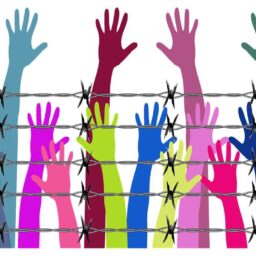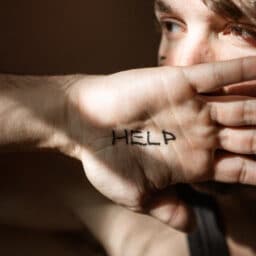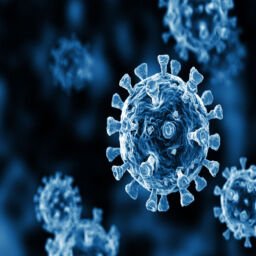INTRODUCTION
“Out of the mountain of despair, a stone of hope”. The covid-19 crises have just created upheaval in our day-to-day living. It has for sure affected every aspect of one’s life. During these hardships of uncertainty, the strict maintenance of public order and law remains to be indispensable[1]. The prevention of the spread of covid has become a challenge to mankind as we need to remember that the virus is no respecter of anyone. It even has created an unprecedented challenge to the law enforcement agenesis who are bound to protect their citizens. And in any crisis, it’s the marginalized or the poor who are considered to be venerable to the unpropitious effects of the pandemic. Human right abuse and violation[2] are the things which are at stake amidst the pandemic, which are needed to be protected at any cost. It has been a harrowing time mainly for the police personnel who were and are at the forefront in the battle against the pandemic as they at any cost have to discharge their duties for the sake of humanity. The authorities had to take the most conspicuous strategy for addressing the Covid-19 situation by implementing strict orders on permitted and non-permitted movements of their citizens and their activities. They had to draft the lockdown regulations which were not supposed to be vague and unreasonable.
POLICING: GLOOM ON HUMAN RIGHTS
Indian police use violence as a shortcut to justice[3], and it’s the poorest who bears the scars[4], this is a fact and the sad reality of our country. We are all very well aware of the police organization and its power which usually is vested with vast surveillance powers, their duty to register offenders, and are more often seen to use their discretionary powers to disproportionately criminalizes the so-called marginalized community. The present-day police system is being governed by a strong colonial legacy. Faith, is what bounds the community together and as history reflects, the police are often seen to use power falsely just for their gains, and this pandemic from its initial days has become a tool to further flout their duties and harass the marginalized ones. Nowadays we have come across many such visuals over social media where the police have taken their rights for granted and are seen using strenuous physical punishments to maintain the law and order. They need to remember that the police have been designated the duty to enforce the policy, not the law. Everyone is seen to be in distress during these hard times and the police being in the frontline to tackle the pandemic usually lose their temper. The way our police treat our fellow Human beings is being questioned to just uphold the Human rights of everyone.
Many are just ignorant of laws and the lower caste or the minorities do not know about the state police, so the police should not take this as an advantage, and it’s evident that there has been no proper check on the police’s discretionary powers[5] while enforcing the lockdown measures. The so-called narratives of criminality are being constructed by the police with the powers they have. As we know that mobility was restricted and this has harmed the venerable groups who work hard to meet their ends. With the alarming situation around, it’s the need of the hour to uphold human rights and address their issues, where the government and the administrations have a vital role to play. The law enforcement agencies should look at the Human rights guidelines to have an apt response to the pandemic and specific strategies have to be taken up to enhance the understanding of rights and responsibilities among the masses.
AN OPTIMISTIC OUTLOOK
Policing-criminal justice system: Law and order are considered to be the two main instruments of the criminal justice system. The police should not abide by the rule by law principle and instead should uphold the principles of rule of law. They have the duty to take up efforts to ensure citizen protection and keeping in mind the risk of pandemic they should reduce custodial arrests for minor crimes, and should take up the public safety orientated approach. As in the current context of the pandemic, the arrests and incarceration for all but the gravest crimes will do more harm than good to public safety. The authorities should take action to enable adherence to the enforcement of laws for the greater good of society. Unlawful use of force and human rights violations in the name of duty need to be tackled. And according to the International Human rights law, the enforcement[6] officials many a time only use force that is necessary and proportionate to achieve a legitimate aim that can be of maintaining proper law and order. The law enforcement authorities need to take up a preventive approach instead of the punitive one. This pandemic has made us realize the number of things we take for granted in life, not to mention, life itself. It has even taught us several valuable lessons, where the police officers are considered to be the first responders of any emergency. Rights should be secured and police reforms are needed to be made. Community policing can bring a social change in our lives. Solidarity and trust between the authorities and the alert community should be encouraged. And as I believe that trust is the biggest weapon and it is this trust that will reinforce or nurture transparency and the rule of law in society. It is visible that the pandemic has restricted the Human rights of a few who are bound to experience the societal stigma, discrimination and violence in the hard times of pandemic. Nelson Mandela has rightly quoted that “to deny people their Human Rights is to challenge their very Humanity”, hence it’s clear that in times of pandemic Humanity cannot be ruined.
CONCLUSION AND WAY FORWARD
It’s just that the measures[7] adopted by the authorities to protect public health need to be strictly implemented and that too in a non-discriminatory way. All-round measures for every community should be considered and the police authorities need to ensure that the coercive enforcement of measures to tackle the pandemic should be considered only as a last resort. Accountability mechanisms should be kept to monitor the excessive use of force, and it’s the responsibility of the state to prohibit discrimination in police laws and develop proper guidelines for the enforcement of law and order. Policing in the pandemic has become indispensable in these hard times. The authorities need to build clear communication with the help of technology, which will automatically pave the way to build trust among the masses. The dignity of individuals needs to be upheld for the greater good of society. Efficiency, transparency and accountability are the main organs of the policing system that even need to be kept intact in these hard times. Because the police here are not to create disorder, they’re here to prevent the disorder.
Author(s) Name: Rathod Arun Kumar (Student, Himanchal Pradesh National Law University, Shimla)
References:
[1] R.K. Raghavan, The Challenge of law enforcement post-COVID-19, The Hindu, (June 3, 2021, 11:10 AM), https://www.thehindu.com/opinion/op-ed/the-challenge-of-law-enforcement-post-covid-19/article31733301.ece.
[2]Muhammad Rahman and Others, Mental Distress and Human Rights Violations During COVID-19: A Rapid Review of the Evidence Informing Rights, Mental Health Needs, and Public Policy Around Vulnerable Populations, frontiers in Psychiatry (January 8, 2021), https://www.frontiersin.org/articles/10.3389/fpsyt.2020.603875/full.
[3] Policing a Pandemic, Carnegie India, https://carnegieindia.org/2020/07/09/policing-pandemic-event-7378 (last visited July 10, 2021, 7:20 PM).
[4] For India’s poor, lockdown policing adds to pandemic hardships, ALJAZEERA, https://www.aljazeera.com/news/2021/4/21/for-indias-poor-lockdown-policing-adds-to-pandemic-hardships (last visited July 9, 2021, 6:30 PM).
[5] “Bound by Brotherhood” – India’s Failure to End Killings in Police Custody, Human Rights Watch, https://www.ecoi.net/en/document/1058454.html (last visited July 6, 2021, 10:00 PM).
[6] Policing in a Time of Pandemic: Recommendations for Law Enforcement, Covid-19 Rapid Response Impact Initiative White Paper 7 (April 10, 2020), https://ethics.harvard.edu/files/center-for-ethics/files/7policingpandemic.pdf?m=1590500595.
[7] Policing the Pandemic: Human Rights Violations in the Enforcement of Covid-19 Measures in Europe, Amnesty International (Index: EUR 01/2511/2020), https://www.amnesty.org/download/Documents/EUR0125112020ENGLISH.PDF.















